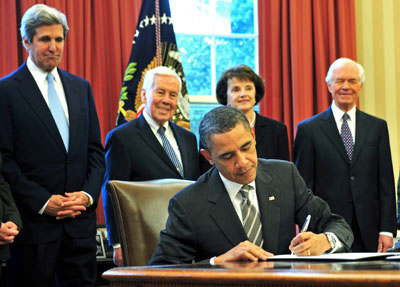New START: Same Baseless Arguments
Michaela Dodge /
The New Strategic Arms Reductions Treaty (New START) has not advanced U.S. national interests since it entered into force. Yet, for the treaty’s proponents, no amount of evidence is enough to recognize treaty’s flaws.
In a recent op-ed, Terri Lodge of the American Security Project assumes that U.S. military planners would be blind without the treaty and would have to plan for the worst case scenario. In fact, the treaty requires unilateral U.S. reductions and allows build-up of Russia’s strategic forces. In addition, since the treaty entered into force, Russia launched the most extensive nuclear modernization program since the end of the Cold War. Russian President Vladimir Putin’s rampant anti-Americanism and periodic threats to use nuclear weapons against U.S. NATO allies do not leave much space for optimism regarding strategic planning.
Lodge assumes that “New START verification measures enhance transparency regarding our U.S. and Russian deployed strategic systems.” This is just not so. New START’s verification regime is severely degraded compared to the original START’s standard. Data exchanges have not provided insights into Russia’s strategic build-up or locations of its strategic systems.
The treaty “does not stipulate the ‘right level’ of modernization funding,” Lodge would have you believe. The Senate’s advice and consent to the ratification of the treaty, however, is contingent upon President Obama’s own certification that he will provide nuclear modernization funding pursuant to the updated Section 1251 of the fiscal year (FY) 2010 National Defense Authorization Act. While the Administration pledged $7.9 billion for nuclear infrastructure modernization in FY 2013, the President’s current budget request misses this mark by $300 million. This calls into the question the political and legal framework in which New START operates.
Moreover, the Russians have repeatedly used New START to limit U.S. missile defense policies, because the treaty’s preamble states that U.S. missile defense capabilities must come down as the numbers of strategic nuclear weapons come down under the treaty. President Obama, for his part, indicated his willingness to accommodate Russian objections to the U.S. expanding its missile defense capabilities after he is re-elected.
As Heritage’s Baker Spring observes, “What is now clear is that whatever commitments [the President] makes to the American people regarding ballistic missile defense in the coming months will be jettisoned in favor of commitments to the Russian government to curtail U.S. and allied missile defense capabilities following the election.”
New START is a failure and must be seen in the context of the failure of the Obama Administration’s “reset” policy with Russia and its desire to achieve a world without U.S. nuclear weapons. The “reset” policy has required too many concessions with few benefits for the U.S. and is in dire need of reassessment. Reductions in the U.S. nuclear weapons arsenal should be driven by an effort to maximize the deterrent value of the U.S. nuclear arsenal, not by disarmament policy as an end in itself.

